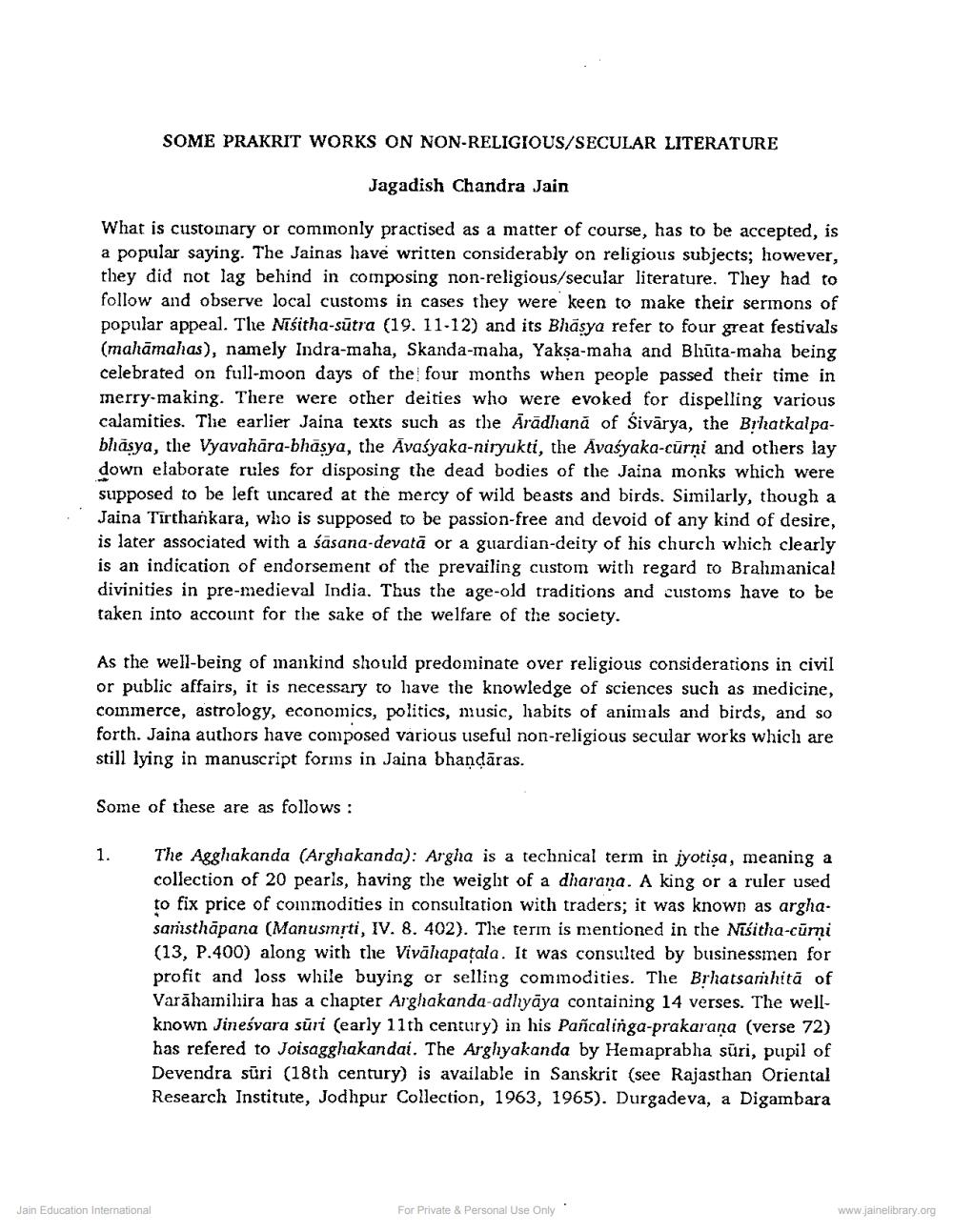Book Title: Some Prakrit Works on Non Religious Literature Author(s): Jagdishchandra Jain Publisher: Z_Nirgrantha_1_022701.pdf and Nirgrantha_2_022702.pdf and Nirgrantha_3_022703.pdf View full book textPage 1
________________ SOME PRAKRIT WORKS ON NON-RELIGIOUS/SECULAR LITERATURE Jagadish Chandra Jain What is custoinary or commonly practised as a matter of course, has to be accepted, is a popular saying. The Jainas have written considerably on religious subjects; however, they did not lag behind in composing non-religious/secular literature. They had to follow and observe local customs in cases they were keen to make their sermons of popular appeal. The Niśitha-sūtra (19. 11-12) and its Bhasya refer to four great festivals (mahāmahas), namely Indra-maha, Skanda-maha, Yaksa-maha and Bhūta-maha being celebrated on full-moon days of the four months when people passed their time in merry-making. There were other deities who were evoked for dispelling various calamities. The earlier Jaina texts such as the Ārādhană of Sivārya, the Brhatkalpabhäsya, the Vyavahāra-bhāsya, the Āvasyaka-niryukti, the Avasyaka-cūrni and others lay down elaborate rules for disposing the dead bodies of the Jaina monks which were supposed to be left uncared at the mercy of wild beasts and birds. Similarly, though a Jaina Tirthankara, who is supposed to be passion-free and devoid of any kind of desire, is later associated with a sāsana-devatā or a guardian-deity of his church which clearly is an indication of endorsement of the prevailing custom with regard to Brahmanical divinities in pre-medieval India. Thus the age-old traditions and customs have to be taken into account for the sake of the welfare of the society. As the well-being of mankind should predominate over religious considerations in civil or public affairs, it is necessary to have the knowledge of sciences such as inedicine, commerce, astrology, economics, politics, music, habits of animals and birds, and so forth. Jaina authors have composed various useful non-religious secular works which are still lying in manuscript forms in Jaina bhandāras. Some of these are as follows: 1. The Agghakanda (Arghakanda): Argha is a technical term in jyotişa, meaning a collection of 20 pearls, having the weight of a dharana. A king or a ruler used to fix price of commodities in consultation with traders; it was known as arghasarısthāpana (Manusmrti, IV. 8. 402). The term is mentioned in the Nīśitha-cūrņi (13, P.400) along with the Vivālapatala. It was consulted by businessmen for profit and loss while buying or selling commodities. The Brhatsamhită of Varāhainilıira has a chapter Arghakanda-adhyāya containing 14 verses. The wellknown Jineśvara sūri (early 11th century) in his Pañcalinga-prakarana (verse 72) has refered to Joisagghakandai. The Arghyakanda by Hemaprabha süri, pupil of Devendra sūri (18th century) is available in Sanskrit (see Rajasthan Oriental Research Institute, Jodhpur Collection, 1963, 1965). Durgadeva, a Digambara Jain Education International For Private & Personal Use Only: www.jainelibrary.orgPage Navigation
1 2 3 4 5 6 7 8 9 10
